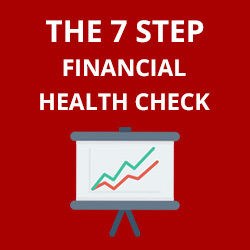At this time of year many people will have already set financial goals. Some will also have set down a budget which they have been sticking to and others will have already gone off course.
Whatever situation you may be in it is always good to conduct a periodic financial health check. Just like your physical health, your financial health should be monitored on an ongoing basis.
This may seem like a difficult thing to do but it is actually very easy. It involves a number of very straight forward thought processes and planning exercises which are really simple and effective.
Managing your financial health is a long term process requiring constant attention, just like managing your actual health.
This short guide will provide you with the information you need to conduct your own personal financial health check.
Here we go!

Starting Out
- Make an appointment
The first thing you need to do is to set down a time and date as to when you will undertake a financial health check. This should be a firm timeline whereby you set an exact date and decide on how long you will need to complete the check.
You should conduct the check in a place that is quiet and free from all distractions. In some cases it may be a good idea to leave your home and find a quiet place if you cannot be assured of peace and quiet.
In advance of the appointment you need to prepare. Gather all of your bank and credit card statements in one place along with any other material related to major income items and expenses.
Review it to ensure it is complete and consists of the most up to date copies that you have. Where items are missing you need to go and find them.
At this point you should also analyze what your major expenses are likely to be over the coming 12 months. Bring along any documentation that may help you to work out how much these items are likely to cost and when you are likely to incur these expenses.
Once you have all of this information together, you are ready to start!
- Conduct an examination
You are now ready to undergo a financial health check. There are three main areas you need to look at when undertaking a financial health check; cash flow; debt and spending.
We will deal with each one of those individually.
Cash flow in this context is related to the point in the month you receive income in comparison to the point in the month you begin to receive bills.
The gap between the time you get paid and the time you have to pay bills should be as small as possible. If the gap is large you run the risk of facing cash flow problems and having to rely on expensive short term debt.
Next step:
Once you have identified how long the gap is you should try to close it. This will help you reduce the risk that you will ever have to rely on short term debt.
This can be in a number of simple ways, change your mortgage payment date if your bank will allow it, change the date that certain utility bills are paid from your account and the most obvious one close the direct debits you don’t need to pay in the first place!
Now you are really getting started!
The next thing to look at is your debt and spending. Ask yourself is all of this stuff really necessary? Am I spending money on things I don’t use and will never need? If so it is a good idea to review whether you can actually stop this type of spending. Try to cut back if you can, how much you cut back by, that might be a difficult question to answer however.
Luckily help is at hand

- The Golden Rule
Once you have begun to improve your cash flow you can begin to look at where that cash is going in much more detail at an overall level. There is a golden rule as to how you should be managing your finances. That rule is known as the 80/10/10 rule.
This rule means that you should save 10% of your income straight away, no more than 10% of your income should be spent paying off debt and the other 80% is then then money you really have.
The first thing to do is to evaluate how you are currently spending your money. You need to ask yourself are you saving 10% of your income, are you spending less than 10% on debt? If not, you need to gain a tighter grip on your finances and try to fit them into that pattern.
There is only one way to do that and that is with a detailed analysis as to where the gains can be made. And here is some guidance on how to do that.
Improving your financial health
- Budget
A budget can be as hard or as easy as you want it to be. If you don’t have on already then one of the things you need to do immediately to improve your financial health is budget.
Start with a simple spreadsheet. In the spreadsheet the first thing you need to write down is your net income. Then write down your expenses. Make sure you distinguish between the bills you have to pay and the bills you choose to pay for fun.
Once you have this done, see how much you can cut from your budget. This may be painful but consider it minor financial surgery.
When you have completed this step apply the 80/10/10 rule again. Can you now save 10% of your income, are you still paying more than 10% of your income in debt payments? If you are then you are going to need long term care.
Increase the payments on your existing debts over a period of time in order to get them below the 10% mark, then use the money left over to push your savings above the 10% mark.
But wait!
This may take a long time but it will be worth it in the end. Once you are managing your finances in line with the 80/10/10 rule you will discover that you are soon in excellent financial health.
Make sure that you are realistic as you adjust your spending. If you do not leave any money available for recreational spending and spending on some of those luxuries that make life worthwhile, you probably will not stick to the budget. So leave a little for those things and it will help to keep you financially healthy in the long run.

- Threats and opportunities
So far we have been thinking about the things you know about. As we know good habits can also prevent illness and this should be the case when it comes to managing your finances too!
In order to prevent any financial mishaps in the future you have to try to identify any future threats to your financial health. This involves some planning and a lot of thinking.
Are there any major expenses which you may face in the next year, five years or even ten years? Will you ever have to pay for a college education?
One of the biggest dangers to your financial health is unexpected expenses so it is important that you try to identify any potential risks as soon as you can.
It is not hard.
When you feel your current budget is under control you are ready to do this. It involves thinking about how your life may evolve over the next ten years and the points at which you may be faced with large expenses.
Looking at your budget the way it is today, could you afford to pay for them? If not the budget you have might not be realistic and you need to rethink it factoring in these big potential costs.
Once you have done this you will find that your long term health is a lot stronger.

- Invest in you
Like anything the best way to keep healthy is to get stronger. This is no different when it comes to your financial health. The way to make yourself stronger is to invest in you.
There are a wide variety of courses available which can be used by you to gain extra skills. Extra skills mean that you can potentially earn more in the labor market. This can totally change how you budget and how you need to budget in the future.
It doesn’t have to be expensive!
Luckily there is now a wide range of free courses available online which mean that investing in you does not have to cost the earth.
Pick a course that aligns with your interests and career plan and go for it. The time you sacrifice now will be more than worth it in the long term with the increased earning power that you gain.
If you are planning on paying for extra training, make sure to ask whether the increased income from the course will cover the cost of the course and any loss of earnings you face when studying! That is a really important point.
In addition to this point if you are taking on additional training for additional gain, try to take on the one with the biggest pay off, not just the one with a pay-off. Write down all of the potential educational and training opportunities you are looking at and rank them according to the financial benefits they will deliver.
This will be an important aspect of the choice you make here.

- Protecting the future
In some cases you may have dependents. It is important that your financial health check makes sure that they will be OK should anything awful happen to you.
There are a number of ways to do this. Firstly review the current life and critical illness cover you have in place. Is it adequate, would it cover everything given the financial circumstances you face today?
If not you need to examine whether you can afford to enhance this area. When dealing with any products like this it is really important to gain professional advice.
When you are examining these products it is important to note that they can be very complex. There is usually tonnes of small print, exclusions and conditions which can be really confusing. It cannot be highlighted enough how important it is to get professional advice when it comes to products such as these.
Another key step to protect the future is to ensure you have a will in place. If you do is it up to date? A will may seem like a scary thing to do but it is an important part of an overall healthy financial package.
In order to do this you will be likely to need legal advice. A will can be relatively straight forward to do. When looking for legal advice make sure you shop around as the cost of preparing a will is likely to vary widely.
Make sure you negotiate hard but as with everything the cheapest option may not be the best. Try to strike the right balance between cost and quality. At this point it is also important to not only consider your own financial health but also how those of your dependents will evolve over time.
Hopefully after reading this post you are well on the way to a healthier financial future. Whilst this post does not cover everything, it should provide you with enough guidance to get you started and well on your way.
Managing your financial health is like managing your actual health. It requires regular check-ups and constant management. You have to expect the unexpected and plan for the future.
At times you will find that you go a little off track but regular check-ups will help you to make sure that you correct these mistakes and do not do any long term damage.
You are now in a much better place to be able to do this. Good luck!



